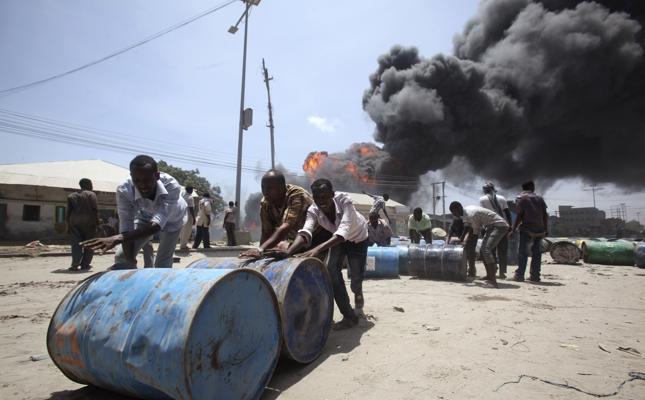
OPEC SEES BELOW $100

The Organization of the Petroleum Exporting Countries doesn't see oil prices consistently trading at $100 barrel again in the next decade, a pessimistic assessment that has the group considering the return of production limits to influence the market, according to a draft of the cartel's latest strategy report.
The report, seen by The Wall Street Journal, predicts that oil prices will be about $76 a barrel in 2025 in its most optimistic scenario, a reflection of OPEC worries that American competitors will be able to cope with low prices and keep pumping out supplies. It also contemplates situations where crude oil costs below $40 a barrel in 2025.
"$100 is not in any of the scenarios," said a delegate at the OPEC strategy presentation last week in Vienna.
An OPEC official declined to comment.
OPEC has been grappling with how to respond to a historic price crash caused in part by a surge in American supplies, thanks to hydraulic fracturing of shale formations deep underground. Normally, the cartel cuts its own production to reduce supplies, and thereby pump up prices, in times of market turbulence, but last year the group decided that wouldn't work.
Instead, some OPEC nations, notably Saudi Arabia, have flooded the market with more crude and cut prices in hopes of keeping customers. In turn, OPEC officials have said the low-price environment could push out some expensive-to-produce oil, such as American frackers, whose costs are high.
The price crash, and OPEC's inability to stop it, is of paramount concern in oil-producing nations that need petroleum cash to balance their budgets. Only two OPEC members—Qatar and Kuwait—can cover their planned government expenditures at $76 a barrel, according to data from the International Monetary Fund. Most members require prices to be well above $100 a barrel; Algeria needs them to be over $130, according to the IMF.
The market has since recovered, with Brent crude, the global benchmark for pricing, trading at about $66 on Monday morning in London.
The oil price could go higher or lower between now and 2025, in OPEC's estimation, and the report is a draft presented at an OPEC staff meeting in Vienna last week. It could change ahead of the group's highly anticipated gathering of ministers in June or before they are asked to approve it later this year.
The report recommends that OPEC return to a production quota system that it largely abandoned in 2011 after fights over how much each country would get to produce. OPEC members have been reluctant to agree to limits because it restricts their ability to attract new business and most ignored their quota.
Now, the likes of Saudi Arabia and Iraq are pumping record levels of crude in a bid to keep or gain market share.
The production quotas scenario under consideration would allow the poorest members of OPEC to produce more. Though the report doesn't mention any particular country, such a policy could make such members as Algeria and Venezuela more agreeable.
"The effect of a weaker, protracted soft market is stronger on some countries than others. So the remedy has to be targeted," the report recommends, according to a person who has seen it.
If OPEC could be a more disciplined organization, it would have more power to influence markets, the official said.
"If they want to sustain the organization, they have no choice," the official said, adding any concession by stronger members would be temporary.
Under the draft OPEC strategy report's recommendations, the quotas could kick in if OPEC's share of the global market fell below its current level of 32%, officials said. The group once produced more than half the world's oil.
"At one point, OPEC won't agree to go lower," one OPEC official said.
The report also recommends that OPEC plan a robust response to United Nations climate change talks in Paris in December. The cartel will argue that new environmental regulators shouldn't withhold energy revenues from developing countries.
"OPEC members don't want to suffer from environment regulations that hurt their revenue," one attendee at the presentation said. The report recommends "OPEC members must aggressively participate in these discussions to limit their negative effects and should have a common stance," the person added.
In the past, OPEC nations have sent their environment ministers to climate talks to adopt conciliatory positions. Now, OPEC is considering sending oil experts as well, officials said, and plans to argue that oil and gas help reduce poverty around the world.
To mitigate climate change, OPEC will offer cleaner ways to produce oil, the attendees at the presentation said.
wsj.com






